
CONTRIBUTIONS TO ZOOLOGY
metrics 2024
Advancing the Frontiers of Animal Science
Introduction
CONTRIBUTIONS TO ZOOLOGY, published by BRILL, is a premier scholarly journal dedicated to advancing the field of zoological sciences. With an ISSN of 1383-4517 and an E-ISSN of 1875-9866, this journal serves as a vital platform for researchers, professionals, and students seeking to share their findings and insights related to animal science, ecology, evolution, and systematics. Recognized for its high academic standards, it ranks in the top quartile (Q1) for Animal Science and Zoology, and Q2 for Ecology, Evolution, Behavior, and Systematics, reflecting its significance and influence in the scholarly community. The journal has been consistently published since 1994 and continues to contribute pivotal knowledge that informs and shapes contemporary zoological research. Researchers can access the journal through traditional subscription models, ensuring broad dissemination of its impactful articles and studies. Contributions to Zoology plays an essential role in fostering collaboration and discussion within the zoological community in the Netherlands and beyond.
Metrics 2024
 0.70
0.70 2.10
2.10 2.30
2.30 39
39Metrics History
Rank 2024
Scopus
IF (Web Of Science)
JCI (Web Of Science)
Quartile History
Similar Journals

PAKISTAN JOURNAL OF ZOOLOGY
Connecting researchers to foster global zoological discourse.Pakistan Journal of Zoology, established in 1975 and published by the Zoological Society of Pakistan, is a pivotal resource in the field of zoology and animal science, contributing to the academic discourse and research advancements in the region. With an ISSN of 0030-9923, this journal strives to disseminate innovative research findings and scholarly articles that explore various facets of animal biology, ecology, and conservation. Although classified in the Q4 quartile within the animal science category, its commitment to providing a platform for emerging researchers makes it crucial for those in the zoological community. The journal covers a broad range of topics relevant to contemporary issues in zoology, promoting both local and international collaborations. Situated in Lahore, Pakistan, its contributions are vital for promoting biodiversity awareness and conservation efforts within the region. Accessible research outputs empower students and professionals alike to engage in critical discussions and applications within the disciplines of zoology and animal science.
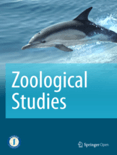
ZOOLOGICAL STUDIES
Unveiling the intricacies of animal life and ecosystems.Zoological Studies, published by the Biodiversity Research Center, Academia Sinica, stands as a pivotal journal in the fields of animal science and zoology. With the ISSN 1021-5506 and E-ISSN 1810-522X, this Taiwanese journal features a blend of pioneering research that spans over three decades, from 1994 to 2024, fostering a deep understanding of biodiversity and zoological phenomena. Recognized for its scholarly contributions, Zoological Studies holds an esteemed Q2 ranking in Animal Science and Zoology for 2023, positioning it among the top-tier journals in its category with a Scopus rank of #164 out of 490—reflecting its strong impact and outreach. While currently not open access, the journal aims to disseminate essential findings and discussions that advance ecological knowledge and inspire future research endeavors. Researchers, professionals, and students alike will find this journal an invaluable resource for accessing critical studies that drive innovation and conservation efforts in the field of zoology.

ACTA ZOOLOGICA BULGARICA
Advancing the Frontiers of Zoological ResearchACTA ZOOLOGICA BULGARICA is a prominent academic journal dedicated to advancing knowledge in the fields of Animal Science, Zoology, Aquatic Science, Ecology, Evolution, Behavior, and Systematics. Published by the Institute of Zoology, Bulgarian Academy of Sciences, this journal serves as an invaluable platform for researchers, professionals, and students to disseminate their findings and engage with contemporary issues in biodiversity and ecology. With an established history since its convergence in 2010 and an ongoing publication schedule through to 2024, the journal holds a Q4 category ranking in multiple disciplines, highlighting its role in fostering scholarly communication in these areas despite its recent entry into Scopus-indexed rankings. Although currently not an open-access journal, ACTA ZOOLOGICA BULGARICA remains a key resource for those interested in the latest research and developments, particularly within the ecological and zoological landscapes of Europe and beyond.

AUSTRALIAN JOURNAL OF ZOOLOGY
Delving into the Dynamics of Australian FaunaAustralian Journal of Zoology, published by CSIRO PUBLISHING, serves as a premier platform for research in the fields of animal science and zoology, with a profound commitment to advancing our understanding of wildlife and ecosystems. Featuring an ISSN of 0004-959X and an E-ISSN of 1446-5698, this esteemed journal encompasses a wide range of topics relevant to ecology, evolution, behavior, and systematics. For the year 2023, it holds a commendable Q2 ranking in both Animal Science and Zoology and Ecology, Evolution, Behavior, and Systematics, demonstrating its significant impact within the academic community. With a rich publication history spanning from 1952 to 2024, the journal caters to researchers, professionals, and students by disseminating crucial findings and methodologies that contribute to effective conservation efforts and informed ecological practices. Although not an open access journal, it continues to foster collaboration and discussion among scholars in Australia and beyond. Located in Clayton, Victoria, the journal remains dedicated to its objective of enhancing knowledge in zoological sciences and addressing vital environmental challenges.

ORGANISMS DIVERSITY & EVOLUTION
Fostering Insights: Bridging Ecology, Behavior, and SystematicsOrganisms Diversity & Evolution is a premier academic journal published by Springer Heidelberg, dedicated to advancing the fields of ecology, evolution, behavior, and systematics. Established in 2001 and continuing through 2024, this journal plays a crucial role in disseminating high-quality research that explores the complexities of biological diversity and evolutionary processes. With a commendable 2023 Scopus ranking of #253/721 in its category, placing it in the 64th percentile, and categorized in the Q2 quartile for Ecology and Evolution, it consistently attracts contributions from leading scientists and researchers worldwide. Although it operates on a subscription basis, the journal's rigorous peer-review process and dedication to impactful scientific discourse make it an invaluable resource for academics, practitioners, and students keen on understanding the intricate relationships that shape our biodiversity. By highlighting innovative research and fostering discussions on urgent ecological challenges, Organisms Diversity & Evolution serves as a vital platform for those committed to conservation and evolutionary biology.
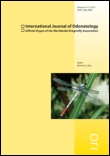
INTERNATIONAL JOURNAL OF ODONATOLOGY
Bridging Ecology and Evolution through Odonate StudiesINTERNATIONAL JOURNAL OF ODONATOLOGY, published by Wachholtz Verlag GmbH, is a vital resource for researchers and professionals in the fields of Ecology, Evolution, Behavior, and Insect Science. Established in 1998, this journal provides a platform for the dissemination of innovative research pertaining to odonatology, encompassing the ecological and biological interactions of dragonflies and damselflies. With its focus on advancing knowledge within these scientific disciplines, the journal holds a commendable Q3 ranking in Ecology, Evolution, Behavior and Systematics and a Q2 ranking in Insect Science for 2023, reflecting its significance in academic circles. Although it operates without open access, its articles are accessible through institutional subscriptions, allowing for wide dissemination among scholars and practitioners. The journal's commitment to publishing high-quality, peer-reviewed research makes it an authoritative source of information that enriches the study of odonates and their broader ecological contexts. For inquiries, the journal's editorial team can be reached at C/O Fleet7, Fleethorn 7, Kiel 24103, Germany.
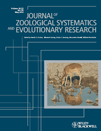
JOURNAL OF ZOOLOGICAL SYSTEMATICS AND EVOLUTIONARY RESEARCH
Advancing the Frontiers of Zoological KnowledgeThe Journal of Zoological Systematics and Evolutionary Research, published by Wiley-Hindawi, stands as a premier academic journal since its establishment, showcasing cutting-edge research in the fields of Animal Science, Zoology, and Ecology. With an impressive track record spanning from 1963 to the present, this journal has earned a Q1 classification in both Animal Science and Ecology, as well as recognized rankings in Genetics and Molecular Biology. Its impact is highlighted by its Scopus ranks, placing it in the top percentile for relevant categories, underscoring its vital role in advancing knowledge and understanding within these disciplines. Researchers, professionals, and students will find a wealth of high-quality, peer-reviewed articles that contribute to the evolutionary understanding of biodiversity and systematics. Though not an Open Access journal, it remains accessible to a wide audience committed to exploring the intricacies of zoology and evolutionary biology.
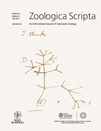
ZOOLOGICA SCRIPTA
Fostering innovation in genetics and evolutionary processes.Zoologica Scripta, published by Wiley, stands as a distinguished journal within the fields of Animal Science and Zoology, Ecology, Evolution, Behavior and Systematics, Genetics, and Molecular Biology. With its inception dating back to 1971 and a convergence year extending to 2024, this journal consistently provides a platform for high-quality research, earning a Q1 ranking in two key categories and solid performance in additional fields, as evidenced by its significant Scopus rankings and impressive percentiles. Notably, it ranks 36 out of 490 journals in Animal Science and Zoology, placing it in the 92nd percentile. While Zoologica Scripta operates under a traditional access model, its rigorous peer-review process ensures that only the most impactful studies make their way into its pages. With a focus on advancing our understanding of biodiversity and evolutionary processes, this journal is indispensable for researchers, professionals, and students committed to the ongoing exploration of animal sciences and ecological studies.
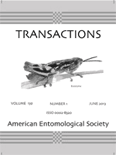
TRANSACTIONS OF THE AMERICAN ENTOMOLOGICAL SOCIETY
Fostering Innovation in Entomological Research and Review.TRANSACTIONS OF THE AMERICAN ENTOMOLOGICAL SOCIETY, published by the American Entomological Society, is a distinguished journal committed to advancing the field of entomology through innovative research and comprehensive reviews. With an ISSN of 0002-8320 and an E-ISSN of 2162-3139, this journal has been a vital resource for entomologists since its inception, showcasing significant findings in insect science as well as ecology, evolution, behavior, and systematics. Although currently not offering Open Access, the journal remains a pivotal platform for professionals, researchers, and students interested in the biological sciences related to insects. The journal's influence is reflected in its Scopus rankings, with a Q3 designation in Insect Science and a Q4 designation in Ecology, Evolution, Behavior and Systematics as of 2023. With a convergence of published years from 1993 to present, TRANSACTIONS aims to foster a deep understanding of insect-related topics, thereby contributing valuable insights that may influence both academic and practical realms within entomology.
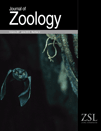
JOURNAL OF ZOOLOGY
Illuminating the intricate relationships of animal life.JOURNAL OF ZOOLOGY, published by Wiley, stands as a premier scholarly journal in the fields of Animal Science and Zoology, renowned for its outstanding contributions to the knowledge of animal biology and ecology. With an impressive impact factor and a strong ranking in the Q1 category for Animal Science and Zoology, as well as Q2 for Ecology, Evolution, Behavior, and Systematics, the journal rigorously engages with both foundational research and groundbreaking discoveries since its inception in 1830. Located in Hoboken, New Jersey, this journal is dedicated to fostering the academic community's understanding of zoological sciences, providing access to important research that shapes wildlife conservation efforts and ecological studies. Although the journal does not currently offer open access options, it continues to attract significant attention, as evidenced by its strong Scopus rankings in related categories. Researchers, professionals, and students will find invaluable resources in the JOURNAL OF ZOOLOGY to advance their understanding of animal life and the ecological challenges it faces today.